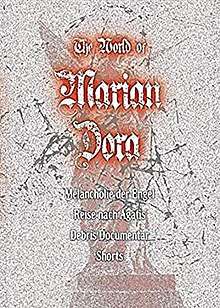Debris documentar
Debris documentar (English: Debris Documentation) is a 75-minute 2012 German-language experimental independent dramatic art film, made in 2003 by Marian Dora.

Synopsis
The film, released on DVD in 2014 as part of a boxset also containitng Melancholie der Engel (2009) and Reise nach Agatis (2010),[1] deals with the everyday life of a man, Carsten (Carsten Frank), who works on the set of the 2004 Ulli Lommel film Zombie Nation. At the same time, he is planning to realize his own film, a task he finds extremely difficult. First, he tries to place casting ads in a supermarket. During his daily work on the film set, the man seems frustrated. Also, he is isolated in his private life, and spends his time by watching and masturbating to his opulent VHS film collection of homosexual rape pornography and films such as Cesare Canevari’s 1977 Gestapo’s Last Orgy, Dennis Donnelly's 1978 The Toolbox Murders, Werner Herzog’s 1974 The Enigma of Kaspar Hauser, Peter Schamoni’s 1976 Potato Fritz, and Rino Di Silvestro’s 1976 Werewolf Woman, and tinkering with props for his own planned film. He also likes to read Astrid Proll’s works about Andreas Baader and Ulrike Meinhof and the writings of Eduard Mörike. In his spare time, he shoots photos of animal cadavers while playing with them, also partly collecting them to take home with him, as he seems to have sexual attraction to them, and rapes women (Martina Adora, Stefanie Müller, and Carina Palmer) in the woods while they urinate. He indulges in several disturbing sexual fetishes including defecating, urinating, necrophilia, bestiality, anal fisting, rape, murder, nose-picking, and other unspeakable acts. He is in regular contact with a prostitute, Patrizia (Patrizia Johann), who puts an enema into her anus and defecates into a bucket while placing the man onto a table, shoving her fist into his anus and pulling feces out of there while he is putting the bucket to his face. By telephone, he also stays in contact with Jesús Franco, Katja Bienert, Peter Martell, and David Hess (who composed most of this film's score). After a while, he actually contacted a woman, Franziska (Alexandra Dumas), who read his advertisement in the supermarket. They arrange a meeting in the man's house. When he tells her what he is supposed to do in his film, the woman gets scared and wants to leave the house. Then, Carsten overwhelms her and kills her by strangling her with a telephone cord and beating her head. Afterwards, he films himself as he is sexually aroused by her corpse. He cuts her nipples off in graphic detail and uses his scalpel to cut the dead woman's clitoris off. He then takes the scalpel and peels the skin off one of her fingers and eats the pieces of dismembered skin. The film ends with a scene showing Carsten burning the same woman's body and going jogging, as in the first shot of this film.[2][3]
References
- Dora Botulino, Marian (2014). The World of Marian Dora (DVD) (in Dutch and German). Breda: BUT (B-Movies, Underground, and Trash) Film Festival. ISBN 9789081779869. Retrieved 13 January 2019. Archived 13 June 2018. The film was shot in 2003, during the time Dora was Ulli Lommel’s assistant (Höltgen, Prof. Dr. Stefan. "Hat nicht so gut geschmeckt" [It Tasted Not So Good]. Telepolis (in German). Hanover: Heinz Heise. 4 December 2005. Retrieved 1 February 2019.), and is meant to provide insights into the pre-production of Melancholie der Engel (Blomdahl, Magnus (March 2017). Revisiting Melancholie der Engel (DVD) (in German). Vorchdorf: Black Lava Entertainment. Retrieved 5 February 2019. Keesey, Prof. Dr. Douglas. Twenty First Century Horror Films: A Guide to the Best Contemporary Horror Movies. Harpenden: Oldcastle Books’s Kamera Books, March 2017, pp. 211–213, ISBN 9781843449065, OCLC 988756769. Retrieved 5 February 2019; Aston, Dr. James (August 2018). Hardcore Horror Cinema in the 21st Century: Production, Marketing and Consumption. Jefferson, North Carolina: McFarland & Company. pp. 16, 55, and 74–76. ISBN 9781476668888. OCLC 1020455458. Retrieved 5 February 2019.). The Germany-produced Reise nach Agatis (English: Voyage to Agatis) is also meant as commentary on Melancholie der Engel: This 74-minute film, which was shot between 27 and 29 May 2008 in Croatia on a budget of €10,000 and which premiered at Weekend of Fear on 2 December 2010, inspired by Charles Berlitz’s 1974 book The Bermuda Triangle, René Cardona Jr.’s 1978 film The Bermuda Triangle, Tonino Ricci’s 1978 film Bermuda: Cave of the Sharks, and David D. Osborn’s 1974 novel Open Season, opens with a scene of a woman tortured and killed on a beach, followed by a seemingly innocent and pleasant yachting cruise under the sun in which an attractive couple, Rafael (Thomas Goersch) and Isabell (Tatjana Lommel), entice young prostitute Lisa (Janna Lisa Dombrowsky) to a dreamy vacation, however, before the end of the day, she will be running for her life as they reveal their psychopathic and violent nature, hoping to wake up from a demented nightmare, as the film ends with Lisa being stabbed multiple times in extremely graphic detail by Rafael, who then proceeds to ram a knife into her vagina, followed by a disemboweling.
- Bordage, Tinam (17 March 2017). Les dossiers Sadique-master: Dissection du cinéma underground extrême [The Sadique-Master Files: A Dissection of Extreme Underground Cinema] (in French). Rosières-en-Haye: Éditions du Camion blanc’s Camion noir, mars 2017. ISBN 9782357799370. OCLC 1035828127. Retrieved 13 January 2019.
- Blomdahl, Magnus (2017). Äkta skräck 2 [Genuine Horror 2] (in Swedish). Malmö: Vertigo förlag, Maj 2017. ISBN 9789186567781. Retrieved 13 January 2019.
External links
- Debris documentar on IMDb
- Debris documentar Film Trailer on YouTube (BUT (B-Movies, Underground, and Trash) Film Festival's Channel) (in German)